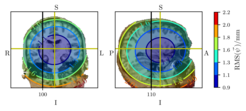Quality assessment of MEG-to-MRI coregistrations
Assessing MRI to MEG coregistration using target registration error.
For high precision in source reconstruction of magnetoencephalography (MEG) data, a high accuracy of the coregistration of sources and sensors is mandatory, because the numerical model of the head is derived from a different modality, namely magnetic resonance imaging (MRI). We suggest using target registration error (TRE) as criterion for the quality of coregistrations (Sonntag et al., 2018).
TRE measures the effect of uncertainty in coregistrations at all points of interest. In total, 5,544 datasets with sensor-to-head and 128 head-to-MRI coregistrations from our MEG laboratory were analysed. An adaptive Metropolis algorithm was used to estimate the optimal coregistration and sample the coregistration parameters (rotation and translation). We found an average TRE between 1.3 and 2.3 mm at the head surface. Furthermore, we observed a mean absolute difference in coregistration parameters between the Metropolis and iterative closest point algorithm of (1.9 ± 1.5)° and (1.1 ± 0.9) mm. The sampled parameters allowed for computation of TRE on the entire grid of the MRI volume. Hence, we recommend the Metropolis algorithm for head-to-MRI coregistrations.

